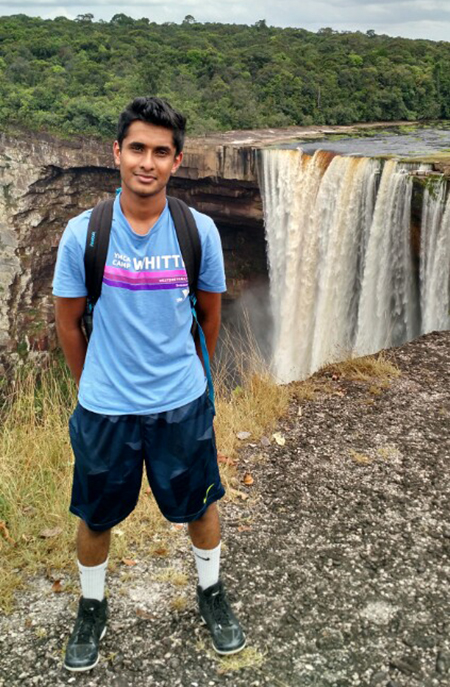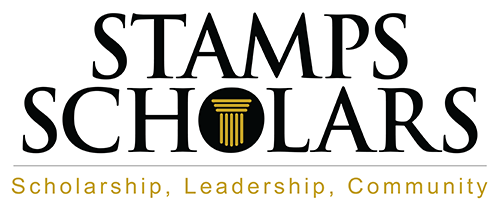 Connecting Artificial Intelligence and Predictive Analytics with Medicine in Developing Nations
Connecting Artificial Intelligence and Predictive Analytics with Medicine in Developing Nations
By Hannah Steinkopf-Frank
University of California, Los Angeles (UCLA) Stamps Scholar Vikash Singh plans to combine his passions for big data, artificial intelligence, and computing with helping developing countries implement cutting edge pipelines for machine learning and advanced analytics.
Singh was born at the Ronald Reagan UCLA Medical Center and “kind of grew up at the school,” because his parents are cancer researchers at UCLA. At University High School, he was on the varsity basketball and volleyball teams. Having played trumpet since age 8, he was in the jazz ensemble and orchestra as well as the Los Angeles Youth Orchestra, the Disney XD Rock Orchestra, and the Los Angeles All City Marching Band, performing in the Rose Parade. “I liked the simplicity and the design of the trumpet. I listened to a lot of jazz growing up, and I liked the creativity associated with the genre.”
In high school, he conducted breast cancer research on the potential health benefits of the Vernonia Amygdalina herb and had his work published for the first time. He was interested in this research for its positive impacts on society and healthcare. Cancer research “was always something on my radar just because my parents grew up doing that.” He then shifted to computational research, working for the Cedars-Sinai Medical Center in its artificial intelligence and medicine program. He studied cardiovascular disease and optimizing methods to evaluate machine learning models.
This experience developed his interest in computational biology, his college major, because it combined his passions for math, medicine, and health. He was drawn to UCLA because of the students’ enthusiasm, the sports atmosphere, and the academic rigor. “Everything is passionate about something and contributing to our overall campus climate in some shape or form.”
He has been involved with UCLA’s Stamps Scholars Society, planning service projects including volunteering at a homeless shelter and a food bank. In addition, he plays intramural basketball and dodgeball and occasionally performs with the UCLA Symphonic Band.
His research, still at Cedars-Sinai, is now focused on the application of deep learning algorithms to diagnose cardiovascular diseases based on nuclear imaging data. “It’s basically a computer helping with the diagnosis or prognosis of certain diseases, finding patterns and mathematical relationships in the data not directly obvious to humans.” Currently, he is finishing a machine learning paper about optimizing evaluation models for diagnosing cardiovascular diseases. At UCLA, he now serves as the computational biology student representative to the faculty committee. “I get to voice my opinion and voice the opinions of the students concerning how the major is going for them and what changes they want to see.”
Outside of school, he built the first predictive analytics pipeline for a startup called Heal, an “Uber for doctors” app that aims to transform healthcare using an on demand service model. He has helped predict the demand for visits and the length of patient wait time with fellow Stamps Scholar Luke Vellotti. He likes that Heal is a smaller company because his contributions can have a “direct impact.” “I get the opportunity to do meaningful work for the company: algorithms that will be implemented into the app and Heal visit scheduling tools, analytics/forecasting that are directly useful to the business development team.”
He was recruited through the City Fellows Program, which was started by University of Southern California Stamps Scholar Eric Deng. “The Fellows Program introduced me to lots of new startups,” said Singh. “I got to meet lots of founders around Silicon Beach and L.A., and I got to connect with a lot of venture capital firms and learn about the local tech ecosystem.
In summer 2015, after his freshman year, he used his Stamps enrichment fund to build Project DataREACH, which implements cutting edge techniques in machine learning and artificial intelligence in developing countries’ medical systems. He traveled to Guyana to give presentations on the project, including to the Minister of Health and National Cancer Institute. He recently grew DataREACH to Cameroon through a collaboration with Songhai Labs, which connects innovators in social entrepreneurship with opportunities to make an impact in developing nations. He has also worked with the regional World Health Organization office, doctors, medical students, epidemiologists, and government officials.
“We understand a lot of the places we are working with don’t have the infrastructure of say Cedars-Sinai, but one of the goals is also to use our technology to start building this infrastructure. It is serving as a bridge between medicine in developing nations and big technology advances.”
For his work, he was awarded the UCLA Global Citizens Fellowship, which funds students to do service projects abroad. He has also recruited fellow students from around the country and faculty and industry advisors to help DataREACH develop. This summer, he is traveling to Cameroon to start integrating a new system built by the DataREACH team for electronic medical record collection and the first medical pipelines for machine learning in the country. His goal is to increase outreach and awareness of this new technology and to connect with a group of Cameroonian digital healthcare providers for a long-term partnership in implementing these pipelines.
“Working with people from around the world opens my eyes to the situation of medicine in different parts of the world, how it varies country by country and how different people are impacted by various health systems.”
For his senior year, he is excited to continue his research and secure more clients for DataREACH. He is considering doing a master’s program in bioinformatics at UCLA or applying to a post-graduate scholarship to further his education. His goal is to introduce the next generation of machine learning and artificial intelligence into healthcare, whether that be in developing nations or in entrepreneurship.
“Without the support of the Stamps Scholarship, I would not have been able to think that starting a project like DataREACH would be possible,” he said. “The scholarship allowed me to go from thinking of ideas I thought would be awesome but perhaps not feasible to truly making them a reality.”
